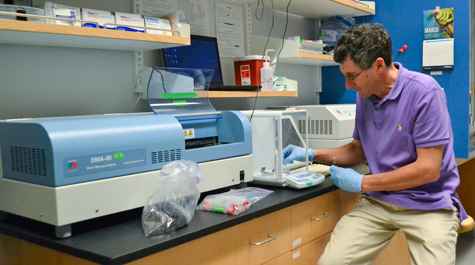April 25 on PBS Frontline: Watching the piscivore’s mercury rise
A William & Mary scientist has a small role — perhaps credited, perhaps not — in an upcoming episode of the PBS program Frontline.
The episode is titled “The Fish on My Plate,” a 90-minute examination of the current state of fisheries and fish consumption by Paul Greenberg, writer, fisherman and seafood activist. Greenberg, the author of Four Fish and American Catch, adopted a daily diet of seafood over the course of a year, an important aspect of the show.
Eating a lot of fish raises the possibility of ingesting a lot of mercury, which has a number of human-health implications. Greenberg enlisted Dan Cristol’s help to monitor his mercury levels during his piscivorous big year.
Cristol, a professor in the university’s Department of Biology, has long been studying the effects of environmental mercury on birds. He and Greenberg worked out an arrangement, which began with Cristol stressing that he is an ornithologist, not a physician, and so his input was not to be construed as medical advice.
“Paul had been eating fish at least one meal a day and sometimes two or three meals a day,” Cristol said. “He would send me a list of all the fish he had eaten in the last couple of months and two hair samples.”
Cristol tested the hair samples in his lab in William & Mary’s Integrated Science Center, using his total-mercury analyzer. He recently added a methylmercury analysis instrument to his lab, an enhancement made possible by the Cabell Challenge, a $1.5 million initiative dedicated to acquiring new scientific instruments for the ISC.
Methylmercury is formed by bacterial action in the environment, Cristol explained. Mercury in its plain elemental form is unable to enter cells, but methylmercury bonds readily with proteins and other biomolecules. Methylmercury is the culprit behind virtually all mercury poisoning, but Cristol didn’t need the new, more sophisticated instrument to monitor Greenberg’s mercury levels.
“I just used the traditional total mercury analyzer. It’s very inexpensive to run. It looks at methylmercury and other forms,” he explained. “But in human hair, it’s well established that almost all the mercury is methylmercury.”
Cristol tracked a rise in Greenberg’s mercury levels as his year of fish-eating progressed. He said that Greenberg avoided several of the most notoriously mercury-heavy foodfish species: shark, marlin, swordfish, tilefish and king mackerel.
“Those fish are always cited as the worst,” Cristol said. “They’re all large predatory fish that live a long time: top of the food chain.”
Tuna was Greenberg’s only indulgence on the list of high-mercury species. When his mercury levels jumped, Cristol advised Greenberg to lay off the tuna. But Greenberg’s mercury levels continued to climb, even after cutting out tuna. Cristol says it’s a mystery.
“He was focusing on the low-mercury fish: salmon, clams and mussels,” he said. “Somehow, he was picking up a lot of mercury, maybe from one piece of fish that had a lot of mercury or maybe from eating a lot of fish that had a little mercury. I don’t know.”
Cristol, after reiterating his lack of medical credentials, said that Greenberg’s mercury tests reached a point high enough to merit concern — “It’s a level that I’d think a doctor would tell you to do something.” He noted that medical authorities generally hold that an adult can’t get mercury poisoning solely from eating supermarket food, without some additional exposure to mercury from environmental/industrial sources.
“However, there have been some documented cases in which people have lost the use of their limbs after switching to a full sushi diet,” Cristol said. “Their heart doctor tells them to stop eating beef and they say, ‘Oh, I’ll do the healthiest thing ever and just eat nothing but sushi.’”
Cristol noted that Greenberg knew about the early warning signs of mercury poisoning. He communicated often with Greenberg, who reported no sign of neurological symptoms that show up as numbness in the limbs, trouble with fine motor skills, tripping, stumbling, etc.
“And various forms of mental disruption — confusion, disorientation and so on,” Cristol said. “Paul Greenberg is perfectly aware of what the symptoms might be and had no symptoms.
“He did complain of writer’s block — but,” Cristol smiled wryly, “writers always complain about writer’s block. Paul seemed perfectly happy and healthy during the year.”
The Frontline episode “The Fish on My Plate” is slated to air on April 25, 2017 at times determined by PBS affiliates.
















